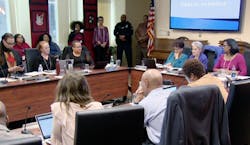Baltimore school board reverses position, says it favors allowing school police to be armed
Two weeks after a shooting in a Baltimore high school, the city’s school board has reversed its position on whether school police should be allowed to carry weapons.
The Baltimore Sun reports that the board voted 8-2 in support of legislation that would amend state law to authorize officers to patrol schools with guns.
The board’s decision comes a month after the 10 members voted unanimously against the idea of arming school police officers. The shift could provide a needed boost to the proposed state legislation.
Neil Davis, a 25-year-old family member of a student, came into Douglass High School on Feb. 8 and allegedly shot special education assistant Michael Marks, 56, a longtime school staff.
The shooting revived the debate over whether school police should be allowed to carry guns.
Baltimore is the only jurisdiction in Maryland with a sworn school police force. In surrounding districts, local police or sheriff’s departments patrol schools and are allowed to carry their weapons.
Under current law, the city’s roughly 100 school police officers are allowed to carry their guns while patrolling the exterior of school buildings before and after school hours, but they are required to store their weapons in a secure location during the day.
Those opposed to armed officers contend that putting weapons in school is not the way to make them safer. Allowing school police to carry weapons, they say, will serve to bolster the school-to-prison pipeline and put black children in particular at risk.
Those on the other side of the debate view the Douglass shooting as further proof that officers must have their guns to keep students and staff safe from an outside threat.
About the Author
Mike Kennedy
Senior Editor
Mike Kennedy, senior editor, has written for AS&U on a wide range of educational issues since 1999.
